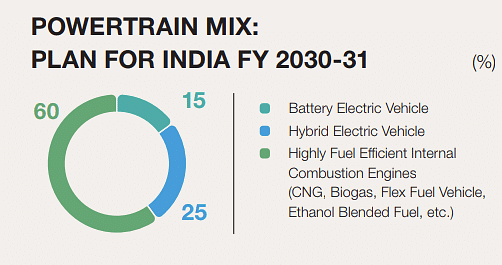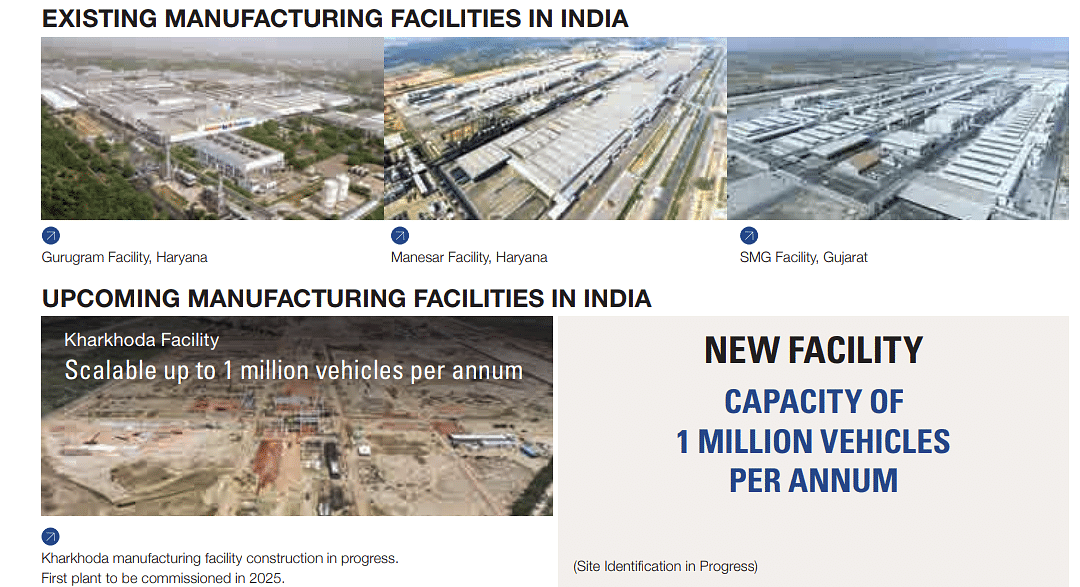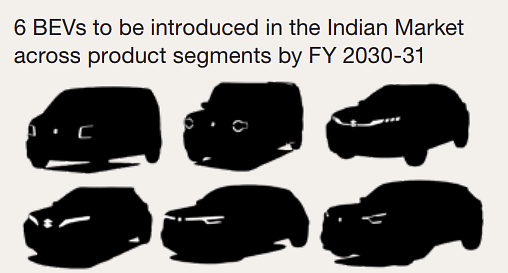Maruti Suzuki kicks off Vision 3.0 to produce between 1.2 to 1.5 million electrified vehicles by FY31
Of the set target of 4 million units by the end of decade, 6 lakh units will be zero emission BEVs, over 1 million hybrid vehicles by the end of business plan.
Maruti Suzuki, the country's largest car maker, has announced its new vision called Maruti Suzuki 3.0, which envisages the company will produce over 1.5 million electrified vehicles by FY31. The maker of Baleno and Grand Vitara will have a portfolio of 28 vehicles by the end of this business plan.
 With a vision to produce over 4 million vehicles per annum by the end of an 8-year business plan, the company in its annual report shared that about 15% or 6 lakh units will be battery electric vehicles, and there will be about 1 million units of hybrid vehicles at the end of the cycle. By then the company will also have a portfolio of half a dozen zero-emission battery electric vehicles.
With a vision to produce over 4 million vehicles per annum by the end of an 8-year business plan, the company in its annual report shared that about 15% or 6 lakh units will be battery electric vehicles, and there will be about 1 million units of hybrid vehicles at the end of the cycle. By then the company will also have a portfolio of half a dozen zero-emission battery electric vehicles.
Out of the 4 million units production plan - 3.2 million units will be the output for the domestic market and Maruti Suzuki envisages about 40% of its output towards hybrids and EVs - which translates to about 1.2 million units for the local market.
 The production capacity of the company will jump over 75% to 4 million units from the current capacity of 2.25 million units.
The production capacity of the company will jump over 75% to 4 million units from the current capacity of 2.25 million units.
The company also guided that its export volumes will jump three times to 7.5 lakh units by FY31.
R C Bhargava, Chairman of Maruti Suzuki in his address to shareholders stated that what is now being planned can be said to be the start of ‘Maruti 3.0’.
He explained that the first phase was when Maruti Suzuki was a public enterprise. The second phase of 2.0 ended with the Covid pandemic, and the Indian car market became the third largest in the world.
 "The challenges before the company are unprecedented. It took us 40 years to create a capacity of 2 million units and SMC helped in this process by establishing the Gujarat facility. Our company now has to add the next 2 million in a period of 9 years. The task of managing all the issues relating to the production of 4 million units a year requires considerable thought and possible reorganisation of the structure of the company, keeping in view the best interests of all shareholders as well as other stakeholders of the company. We will, as soon as possible, announce what we are proposing," elaborated the chairman.
"The challenges before the company are unprecedented. It took us 40 years to create a capacity of 2 million units and SMC helped in this process by establishing the Gujarat facility. Our company now has to add the next 2 million in a period of 9 years. The task of managing all the issues relating to the production of 4 million units a year requires considerable thought and possible reorganisation of the structure of the company, keeping in view the best interests of all shareholders as well as other stakeholders of the company. We will, as soon as possible, announce what we are proposing," elaborated the chairman.
On the uphill task ahead, Bhargava, an industry captain who has been a lynchpin of Maruti Suzuki's progress for decades, stated that the challenge in front of the company is not only to produce 4 million cars a year but possibly higher volumes in the subsequent years and the company will also have to sell this number of cars.
"By FY 2030-31, our company could have about 28 different models. Clearly, the organisation and systems for selling such a large variety of cars will require changes from what exists at present," he added.
On the development of electric vehicles, he said it is proceeding well at the Gujarat facility, and the company expects to start the sale of the first model in 2024-25.
 "By 2030-31 we expect to have 6 EV models. These models are expected to comprise 15-20% of our total sales by that time. As I have said elsewhere, the conditions in India require that the attainment of carbon neutrality in the transportation sector should be achieved by a mix of technologies that are appropriate to our resource endowment and economic conditions," explained Bhargava.
"By 2030-31 we expect to have 6 EV models. These models are expected to comprise 15-20% of our total sales by that time. As I have said elsewhere, the conditions in India require that the attainment of carbon neutrality in the transportation sector should be achieved by a mix of technologies that are appropriate to our resource endowment and economic conditions," explained Bhargava.
The head of Maruti Suzuki said the industry must use the enormous amount of animal waste that is generated in the country. Equally large is the opportunity created by our agricultural and other waste as well as the potential to increase the output from our land resources.
"The use of hybrid technology, ethanol, Compressed Bio-gas, and CNG in cars will all lead us faster to our goal of reducing the carbon footprint than relying only on any one technology," he added.
RELATED ARTICLES
JK Tyre to Invest Rs 1,130 Crore to Expand Capacity by FY28
Expansion across TBR, LTBR and passenger car radial tyres to come on stream by Q2 FY28.
JK Tyre Reports 3.7-Fold Surge in Q3 Profit Amid Strong Demand and Margin Expansion
India's leading tyre manufacturer posts Rs 209 crore net profit for Q3 FY26, driven by robust domestic growth, premium p...
Olectra Greentech Appoints Suhas Athma as VP-Human Resources
Olectra Greentech Limited has appointed Suhas Athma as Vice President-Human Resources, effective February 6, 2026, bring...






 05 Aug 2023
05 Aug 2023
 23107 Views
23107 Views





 Darshan Nakhwa
Darshan Nakhwa


 Sarthak Mahajan
Sarthak Mahajan


